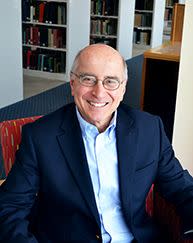Harry Paidas: Finding life's finish lines

A familiar refrain from runners toward the end of a long race is “where is the finish line?”
It’s largely rhetorical because runners actually know where the physical finish line is but due to exhaustion and the wishful thinking that the finish line is near, the question enters into the mix of mind over matter in endurance races.
As an aside, I actually had one race that ended in a debacle because the volunteer who was supposed to tell runners to hang a left on the course toward the finish line went on a potty break at an inopportune time resulting in most of the runners going straight. The result was like something out of “The Benny Hill Show” as all the runners circled back around after a marshal came cycling up to tell us to turn around. As one would expect, the results were invalid.
But in most cases, asking about the finish line is a mere formality because we all know where it is; it’s just that we wish it would appear sooner.
Such is not the case in all of the finish lines of our lives.
For example, I don’t think any of us is in a hurry to get to the ultimate finish line because once we get there, we’ll be off to the next life. As I get older, realizing the finish line is nearing, I am not anxious to get there. In fact, taking a few detours along the way to prolong the race is pretty appealing.
I am not sure I would live the rest of my life differently if I knew where the finish line actually was, so in this case I am not actually seeking it out. In fact, I am grateful that I have been granted a marathon course rather than a 5K.
Other than the ultimate race (against time) there are other races that have entered the picture lately.
When I started my career in higher education in 1976, I had no idea where the finish line was. I knew the government had placed a finish line at age 65 but higher education typically offered incentives to finish early at 62. So, after 38 years of working, I decided to cross the finish line early.
There were others with whom I worked that weren’t so lucky, having either quit the race much earlier or they didn’t live long enough to finish.
A more recent world event lends itself to comparisons to a race with a finish line that keeps changing. The pandemic that we have been battling for the last few years has been compared to a marathon, but the finish line keeps getting pushed back. Given the variants and the novelty of the virus this marathon appears to have evolved into an ultra-marathon with no clear-cut finish line.
Like the pandemic, another event has also entered the picture. We were warned that democracies don’t last forever. While I never doubted that this was true, I did not expect that to be a cause for worry during my lifetime. Throughout my life, I have been confident that our leaders have been protective of our democratic form of government.
My late father, a World War II veteran, made it clear to me as a child how important it was to win that war and preserve our democracy. Threats from Russia, foreign terrorist groups and China subsequently have all been serious but not enough to threaten our democracy.
We should have seen it coming, but the threat to our democracy is coming from within and it is at our doorstep.
We Greeks are responsible for the concept of democracy dating back to ancient civilization and then it was given new life in the 18th century. Its popularity allowed it to be the government of choice among our founding fathers. It has had a good run, but it would appear that the finish line looms ahead.
I get the impression that our population is tired and that many of our leaders are delusional. It happens during the course of running a marathon. Democracy’s finish line has been pushed back on numerous occasions and, like life’s finish line, it is one that we should not be anxious to reach.
-30-
Harry Paidas is faculty emeritus at Mount Union and writes a monthly column for The Review. He can be reached at paidashp@mountunion.edu.
This article originally appeared on The Alliance Review: Harry Paidas: Finding life's finish lines
